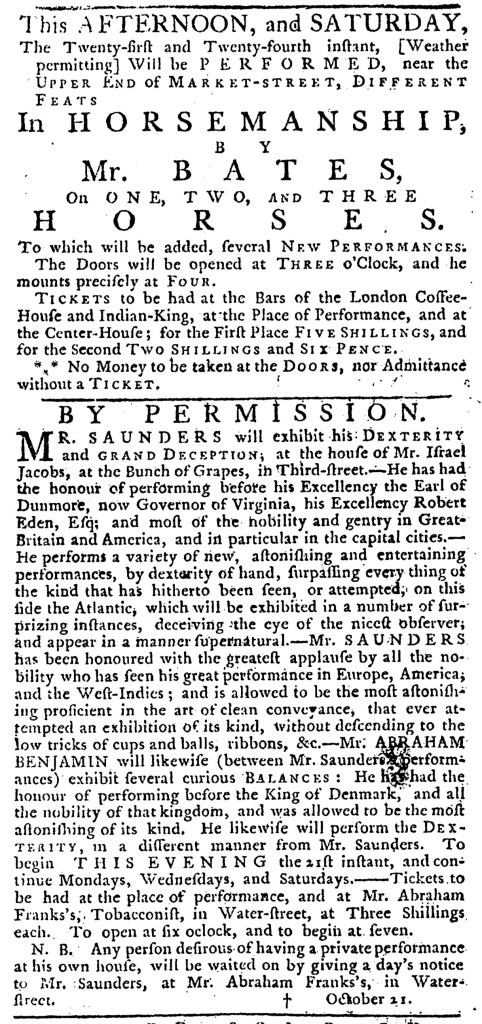What was advertised in a colonial American newspaper 250 years ago today?

“MR. SAUNDERS will exhibit his DEXTERITY and GRAND DECEPTION.”
Newspaper advertisements help in revealing some of the entertainments enjoyed by colonizers in the eighteenth century. For instance, two advertisements in the October 21, 1772, edition of the Pennsylvania Journal promoted upcoming performances and encouraged residents of Philadelphia to purchase tickets. The first offered feats of “HORSEMANSHIP, BY Mr. BATES,” promising that he did tricks “On ONE, TWO, AND THREE HORSES.” Bates and his act would have been familiar to regular readers at the time this advertisement appeared, so to entice anyone who had already seen the show to come again he proclaimed that he added “several NEW PERFORMANCES.” Patrons needed to purchase tickets in advance since “No Money [would] be taken at the DOORS, nor Admittance without a TICKET,” yet they also received a discount for purchasing more than one. The first ticket cost five shillings and the second only two shillings and six pence. In other words, Bates advertised a “buy one, get one half off” promotion.
The other advertisement announced that “MR. SAUNDERS will exhibit his DEXTERITY and GRAND DECEPTION … at the Bunch of Grapes.” Most likely, Hyman Saunders, the illusionist and itinerant performer who previously advertised in newspapers in both New York and Philadelphia, placed this notice. He boasted that he “had the honour of performing before his Excellency the Earl of Dunmore, now Governor of Virginia … and most of the nobility and gentry in Great-Britain and America, and in particular in the capital cities.” Saunders described his act as “dexterity by hand, surpassing everything of the kind that has hitherto been seen, or attempted, on this side of the Atlantic,” intending that such hyperbole would motivate readers to come to the show. As a bonus, they would also see “Mr. ABRAHAM BENJAMIN … exhibit several curious BALANCES,” feats of “DEXTERITY, in a different manner from Mr. Saunders.” Benjamin previously “had the honour of performing before the King of Denmark, and all the nobility of that kingdom.” The pedigrees of both performers likely resonated with residents of Philadelphia who aspired to be as cosmopolitan as their counterparts in European cities. Patrons could purchase tickets in advance at the Bunch of Grapes or “at Mr. Abraham Franks’s, Tobacconist.” Saunders advised that performances would “continue [on] Mondays, Wednesdays, and Saturdays.” Colonizers could also hire him for private performances in their own homes, entertaining themselves and guests fortunate enough to receive invitations.
Performers used newspaper advertisements to drum up interest in their performances in early America. They likely resorted to handbills and broadsides as well, though those kinds of advertisements were more ephemeral. Itinerant performers depended on publicity to draw audiences to their shows. Even those who spent some time in town had to resort to promoting their acts to keep audiences coming or coming back for more.
